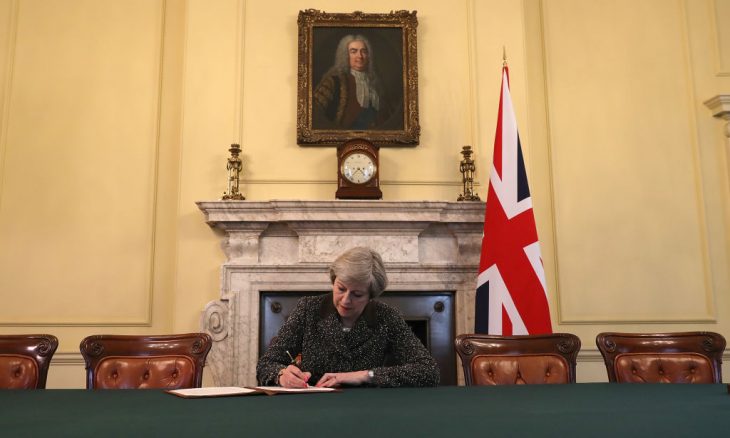Theresa May has put pen to paper on the Article 50 letter that will kick-start the process of Brexit. March 29th, 2017, will join June 23rd, 2016, as a key date in Britain’s modern history. The papers are unanimous in seeing today as a momentous moment. But they are also clear in their view that the challenges ahead will be big. On the day Theresa May formally pulls the Brexit trigger, here’s what the newspaper editorials have to say:
‘It’s finally here,’ says the Sun. The paper hails today as ‘the most momentous day in Britain’s modern history’ – and marks the occasion by beaming the words ‘Dover and Out’ on the white cliffs of Dover. So, what can we expect? A ‘tricky two-year extrication from Brussels’ grip’ is inevitable. Yet this is all part of the process that will lead to ‘the plotting of a new course towards a better, more prosperous future’. The Sun says there’s no doubt that it is delighted that it has come to today and that we’re leaving the EU. But the paper says that it also has ‘no illusions that negotiating our exit will be easy’. And nor does it expect what it calls the ‘sneering, divisive rage of hardcore Remainers’ to die down once the trigger has actually been pulled. To this group, the Sun has a message: ‘It is vital we get behind Mrs May’, saying that, after all, we must remember that ‘we are not leaving Europe, merely Brussels’ trading club’. And from 2019, the ‘politicians we elect will control our future’. ‘Today it begins for real,’ the paper concludes: ‘and we can’t wait’.
Today is an ‘historic day’, says the Daily Telegraph. There are many ‘who have for so long dreamed of this moment’. To them, ‘a toast is irresistible’, given that the triggering of Article 50 marks the ‘accomplishment of an impossible dream’. But the Telegraph shares the Sun’s analysis that, for all its optimism, there will be stumbling blocks on the road ahead. The problem, says the Telegraph, ‘boils down to perspective. Theresa May has ‘signalled that her focus is on the future’. But for many in Brussels, the emphasis is on ‘punishment’. ‘They want to make Britain pay, to set an example,’ warns the paper. ‘The contrast in attitudes is sobering’, says the Telegraph, which points as well to European leaders’ refusal to address the charged political topic of EU citizens’ rights after Brexit. ‘This stubbornness is reminiscent of the EU’s behaviour during Mr Cameron’s renegotiation effort,’ suggests the Telegraph, which says the EU’s attitude – which ‘serves an emotional need to put the UK in its place…amounts in the long-run to self-harm’.
It will be a ‘fraught and uncertain course’, warns the Guardian, which says Brexit will ‘weaken the remaining 27 members’ – and will also ‘set this country on a decade or more of instability’. The Guardian mourns the end of a ‘partnership that has brought much more to Britain than can be guessed at from the churlish nature of our relationship’, saying the ‘European Project..is woven into our lives’. A ‘hostile press’, says the Guardian, turned Brussels into the ‘default excuse’ for failure. And yet that view misses the good things about the EU, such as the working time directive which gave Brits a shorter working week; EU funding; and ‘clean beaches’ for our kids to play on. But now, we’re off. So, what should be first on the Prime Minister’s agenda? The Guardian says that ‘the fate of all EU nationals who were living in Britain, or Britons living elsewhere in Europe…should be treated as a matter apart from the other negotiations’. Joining forces with other European papers, the Guardian says that we should remember Brexit talks will inevitably be ‘bad tempered’ at times. Guaranteeing the ‘rights of each other’s citizens’ would be a ‘wise’ step, the paper concludes.
The Daily Mail hails a ‘momentous day’, calling the triggering of Article 50 the moment those ‘who have grown disillusioned with the EU feared they would never see’. Even after the referendum, there were fears that the ‘europhile political and judicial Establishment’ would do its best to block Brexit. Yet it is to Theresa May’s ‘huge credit’ that she has ‘put the electorate’s decision into effect’. ‘Brexit means Brexit,’ she said – ‘and today she’s as good as her word,’ the Daily Mail says in its leader article. It’s true that the ‘hard work’ begins in earnest: an ‘unaccountable eurocracy pressing for a punitive deal’ will do its best to put off those who see want to emulate Brexit. While the ‘Remoaners’ back home will inevitably remain intent on trouble, warns the Mail. But to the ‘prophets of disaster’ the Mail – which told its critics yesterday to ‘get a life’ following a row about its front page – has another message: ‘calm down’. After all, on this ‘historic day’ is it ‘too much that we should eschew the doom-mongering and pull together’ – and get the ‘the best deal for the benefit of ALL Britons?’.
Some have said that Brexit negotiations will be the ‘biggest diplomatic challenge in modern British history’. ‘They are more than that,’ says the Times. From the ‘minutiae of the financial horse-trading’, to ‘multi-sector trade talks’, the culmination of these talks over the next two years will result in ‘nothing less than a new British identity’ emerging. But make no mistake, says the Times, today is a crucial moment in our history. It is also, too, of ‘seismic importance’ for the recipient as well. The UK ‘must hope that Brexit nudges Europe away from federalism and towards a more flexible, commercial union’, says the paper. While for Brits, our ‘economic vitality’ and the simple fact of ‘what it means to be British’ is at stake. The ‘celebrations’ for those who backed Brexit are over, says the Times – and now ‘the hard bargaining begins’. And ‘Mrs May and her ministers will be judged generations hence by how they handled it’.







Comments